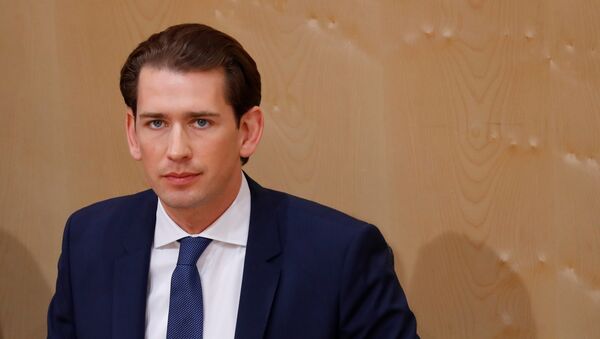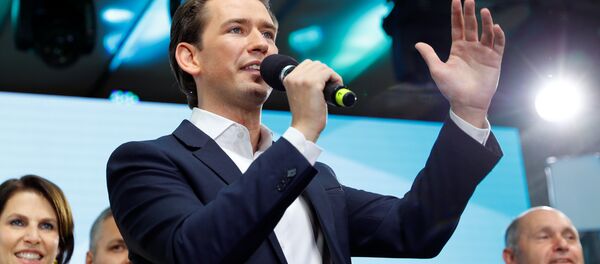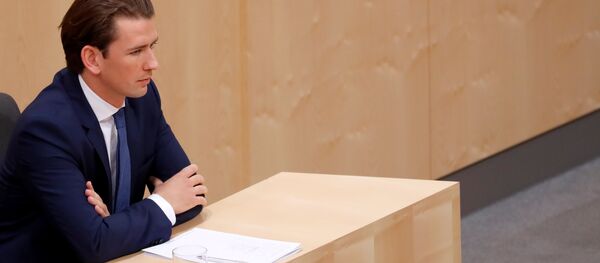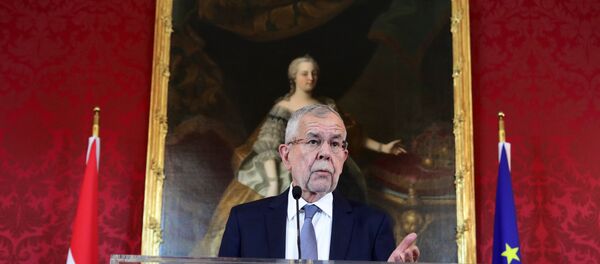For the first time in the country's history, an Austrian Chancellor has been voted out of parliament by a vote of no confidence. Chancellor Sebastian Kurz faced sharp criticism in the National Council. "The Kurz government has failed," Jörg Leichtfried, the deputy leader of the Social Democratic Party of Austria (Sozialdemokratische Partei Österreichs, SPÖ), said at the parliamentary debate in Vienna on Monday.
"Absolute Power Politician"
Dr. Benjamin Opratko, an Austrian political scientist at the Institute for Political Science at the University of Vienna agreed with the MPs' statements that "Sebastian Kurz is an absolute power politician." "It's rather funny that the FPÖ has only noticed that," he added.
According to Dr. Opratko, Kurz had first succeeded through internal changes in his own party. After he'd taken over the ÖVP, he gave himself powers within his own party, specifically "the seizure of leverage in federal and land lists. In Germany, that would be unthinkable," Opratko said. The policies of the ÖVP-FPÖ coalition were very much determined by the Freedom Party: "As long as it was possible, they were quite willingly arranging with Kurz."
Now the FPÖ is being forced to portray the Ibiza publications as the "sabotage of a successful government by Sebastian Kurz" due to the chancellor's strive for power, the political scientist explained.
"It is about positioning oneself in view of the new elections," Opratko, said, venturing that it "will certainly be a tough fight for the right-wing voters between the FPÖ and ÖVP".
Briefly Strengthened by EU Elections
Kurz tried to defend himself against the attacks in parliament — he expressed his lack of understanding that the SPÖ has extended the vote of no confidence to the entire government.
"What I really don't understand is such a reaction to yesterday's election results, that the vote of no confidence against me is now extended to the whole government," Kurz said during the parliamentary debate. Whoever wants to overthrow the entire government now doesn't have the well-being of the country in mind.
However, the researcher doesn't believe that the socio-political balance of power in Austria will shift massively. The video wouldn't change the fact that right-wing politics dominate in Austria.
"The Strength of Kurz Is the Weakness of the SPÖ"
Opratko believes the SPÖ is responsible for the current situation.
"The spectacle that the Social Democrats have showed in the last few days was unworthy."
There have been substantive reasons to deprive the chancellor of his position. However, according to the political scientist, the party emphasised them too little.
"Instead of saying: 'we have no political confidence in the Chancellor that has led this government with the FPÖ and is ultimately responsible for everything that has happened in the past ten days as well as the past year and a half of malicious state policies', we see manoeuvring, whether or not they support a motion of no confidence, under what conditions and whether one should now maintain stability in the interest of the state or not."
On the contrary, the "right-wing populists" of the ÖVP and the FPÖ have a clear and understandable political programme, Opratko said.
"It focuses on exclusion, hardness, the strengthening of borders and looking for scapegoats; and it can be easily conveyed to the electorate."
READ MORE: Austrian Chancellor Kurz Loses No-Confidence Vote Amid Video Scandal
In contrast, over the past 20 years, the SPÖ social democrats have delivered no independent programme, the researcher said.
"In term of economic policy, (the SPÖ) has adapted itself to the neoliberal mainstream and is also trying to show itself as a socio-politically friendlier alternative. But if you ask them what they really want to change, you'll get a weakened version of what the neo-liberals, conservatives and rightists are advocating anyway."
Successor to Kurz
After the successful vote of no confidence, it's Austria's president's turn to act now. He has to look for a new federal chancellor.
"This must be a person who enjoys confidence and respect beyond party boundaries, because otherwise at the next parliamentary session, this person could be voted out with the next motion of no confidence," Dr. Opratko explained.
"It won't be easy"
Former EU Agriculture Commissioner Franz Fischler (ÖVP), who has already been discussed by the media and experts, could be a possible transitional chancellor until the planned new elections in September.
Consequences for the ÖVP and Austria
"The ÖVP will never benefit from a motion of no confidence; it may even be detrimental because the party can no longer access the entire state apparatus for the election campaign — the many, many employed people the party uses for its own interests and has used in the past," the researcher said.
That alone was also an important reason for the opposition to not give the ÖVP this advantage, Opratko clarified.
"I have to disappoint those who have called for my resignation. I am still here. The changes that started here two years ago will not end. Today, parliament has decided, but in the end it's the people who will decide, and that's what I'm looking forward to," Kurz said to his followers following his vote of no confidence.
By Paul Linke for Sputnik Deutschland
The views and opinions expressed by Dr. Benjamin Opratko are those of the speaker and do not necessarily reflect those of Sputnik.






